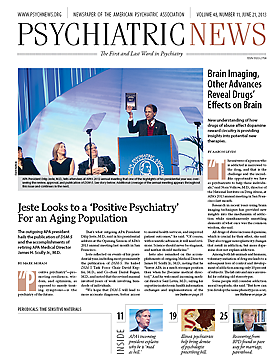New research by British scientists sheds light on how stress can cause a series of molecular events in the brain that blocks nerve-cell growth in the hippocampus, which is linked to depression and other dysfunctions.
These findings were published online May 6 in Proceedings of the National Academy of Sciences by Christoph Anacker, Ph.D., of the Institute of Psychiatry at King’s College London, and colleagues.
The study points to an enzyme, known as serum- and glucocorticoid-regulated kinase 1 (SGK1), as a potential target for the development of new treatments for depression.
In past research, the proliferation and differentiation of neurons has been linked to the therapeutic effects of antidepressants. It has also been shown that patients with depression have chronically elevated glucocorticoids, hormones that are released under stressful conditions. The elevation of glucocorticoids activates the glucocorticoid receptor (GR) in the brain and blocks the process known as the Hedgehog signaling pathway, a key molecular process that “tells” stem cells to grow into specialized cells of various functions.
By adding cortisol to precursor cells of human hippocampal neurons, the researchers found that GR activation alone is not enough to block cell growth. Rather, this process is mediated by SGK1 and can be prevented by a small molecule that inhibits SGK1. In addition, the cortisol’s negative effect on the Hedgehog signaling pathway and on reduced neurogenesis can be counteracted by the SGK1 inhibitor.
Curiously, the authors also discovered that, although SGK1 acts downstream from GR activation, the kinase also acts on GR and prolongs GR activation after cortisol is removed from the cell environment. Hours after cortisol is removed, SGK1 expression remains elevated and GR remains activated. The authors suggested that this mechanism may be responsible for long-lasting detrimental effect of stress on brain cells, even after glucocorticoids return to normal levels.
Beyond the in vitro experiments with neural stem cells, the researchers found additional evidence of SGK1’s role in mice and humans. First, they analyzed blood samples taken from 25 depressed patients and 14 healthy controls who participated in the GENDEP clinical trial. The patients, who had been treatment free for at least two weeks before the test, had a 2.5-fold increase in the SGK1 mRNA level compared with the healthy controls, and the difference was statistically significant.
Next, mice were put under unpredictable chronic mild stress or prenatal stress. These types of stress have been shown to reduce neurogenesis in mouse hippocampus. Consistent with all the previous results, the mouse brain showed elevatedSGK1 mRNA in ventral and dorsal hippocampus after being exposed to stress. These areas of the hippocampus have been associated with mood and cognition.
Given the central role of SGK1 linking stress to reduced neuronal growth in the hippocampus, the authors suggested that “SKG1 may represent an antidepressant treatment strategy.” ■
